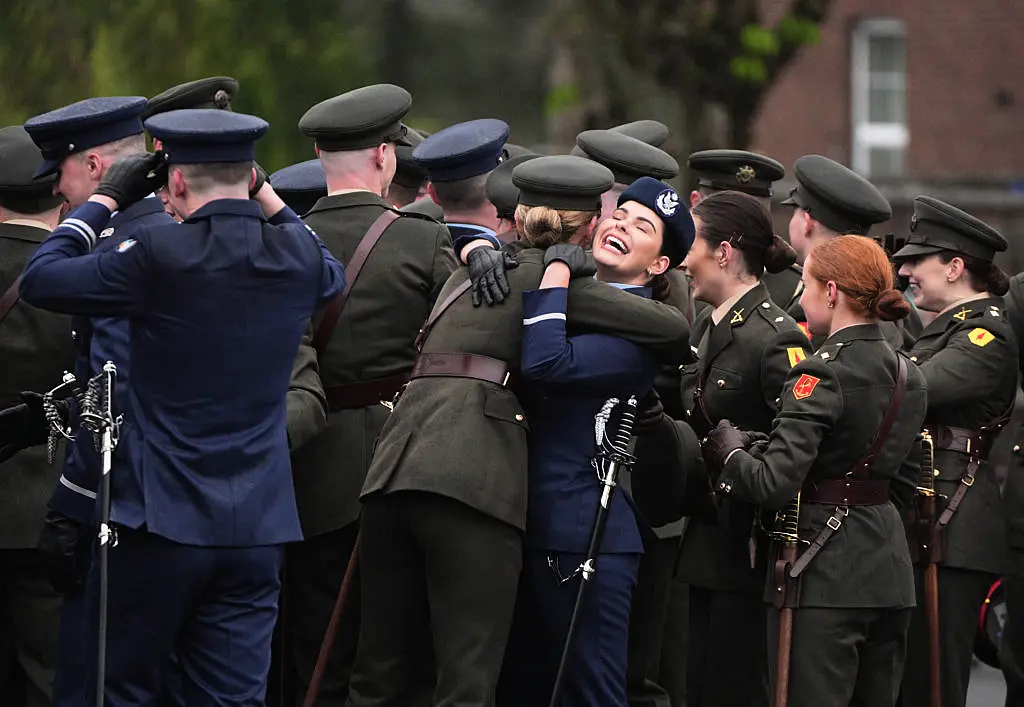The Defence Forces' "historically low" numbers of 7,500 are a reflection of the slow pace of implementing recommended reforms, according to the General Secretary of the Representative Association of Commissioned Officers (Raco).
In his speech at Fine Gael's Ard Fheis earlier this month, Taoiseach Simon Harris highlighted defence, saying neutrality was no excuse for complacency.
However, Ireland's vulnerability has been continually highlighted by security experts in recent times.
In late 2022, the Commission on the Defence Forces made a series of recommendations to address the capability, staffing and structural gaps in Ireland’s armed forces.
The Commission reported, and identified three separate Levels of Ambition (LOA). The Government decided to opt for LOA 2.
This includes a net increase in the permanent Defence Force establishment of some 2,000 personnel, bringing the total to approximately 11,500, to provide for a range of recommendations made including double crewing of naval ships, creation of a separate training establishment, increasing staff resources for a number of units and providing the resources required to undertake the necessary human resources and command and control structural reforms.
Raco general secretary Conor King told BreakingNews.ie: "The Government chose LOA 2 in the knowledge that, according to the Commission, this would not deliver the capability required to develop full spectrum defence capabilities on a par with other sovereign European countries.
"Shortly after the publication of the report of the Commission on the Defence Forces in February 2022, war returned to Europe for the first time in three decades, with the Russian invasion of Ukraine. But our plan remained unchanged. Rather, the organisation has failed to reverse the trend of exits, and strength has fallen to a historically low 7,500 personnel. Instead of immediately securing LOA 2, and moving to LOA 3 (provision of a credible defence, on a par with comparator countries), we have deteriorated further."
Mr King pointed out that despite the commitment to increase defence spending, Ireland spending is one of the lowest in Europe.
Ireland still spends, and appears set to continue to spend, the lowest amount on defence in the entire European Union.
"It has been reported that the annual defence budget increased to €1.21 billion in 2022 and €1.23 billion in 2024, with an annual capital spend of €176 million in each year. Although this has been hailed as a record capital spend provided to defence, it is coming from a very low base, and Ireland still spends, and appears set to continue to spend, the lowest amount on defence in the entire European Union."
He added: "In terms of defence capability, the glaring gaps identified by the Commission have yet to be closed two years after the report, so one would have to believe that the state remains vulnerable. Our geographical location is no longer an excuse to neglect investment in defence and security."
On the implementation of the Commission's recommendations, Mr King said there had been positives, including an increase to Naval Service patrol duty allowance, the extension of private healthcare arrangements for enlisted personnel, and the delivery of a new fixed wing military transport aircraft (expected in mid-2025).

However, there have still been delays.
For example, the Naval Service allowance was "only delivered after the Naval Service was reduced almost to a point of failure, with just one ship currently operational due to a lack of crew".
He added: "Additional key recommendations that are close to delivery and that can make a real difference to retention of Defence Forces personnel are the removal of blanket exclusion from the Organisation of Working Time Act, and the enactment of primary legislation to give effect to associate membership of the Irish Congress of Trade Unions, and to restore oversight to the Defence Forces, which was removed by the Department of Defence in 2018."
He said that the Working Time Directive should be "urgently negotiated between management and representative associations".
"A failure to provide adequate rest and compensatory time off to military personnel has significantly impacted their home-life and the ability of many to sustain a career in the Defence Forces, and for far too long, members’ time has been treated as an infinite resource, without consideration of work-life balance.
Work-life balance
"The fact that our organisation has never even recorded working time, in contravention of EU law, and still does not, denies Defence Forces members access to benefits such as overtime which are available to other public sector employees, thereby depriving the organisation of a fundamental retention tool. It is essential that the Directive is implemented urgently, where it can be a game changer for morale, work-life balance and retention."
While positive changes are being seen, Mr King stressed the need to fully implement LOA 2, and move towards the third level of recommendations from the Commission.

"Personnel acknowledge that there is much important work being done to implement the recommendations of the Commission and are starting to see some green shoots of recovery. Nevertheless, recent geopolitical developments mean that we have no time whatsoever to waste in fully implementing the Commission recommendations and moving without delay towards LOA 3. The most important key performance indicator, and measure of whether employment policies and conditions of service are attractive and effective, is the strength of the organisation.
"Since the Commission reported in February 2022, Defence Forces strength has fallen by a further 1,000 personnel, to its current low of approximately 7,500 all ranks. This suggests that not all members have bought into the transformation effort, and this will require listening to ‘employee voice’ to ensure buy-in, rather than sidelining it."
Reporting by James Cox
Keep up to date with all the latest news on our website Beat102103.com.






